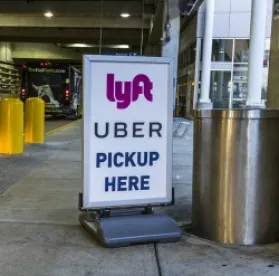On November 26, 2019, San Francisco Superior Court Judge Richard B. Ulmer ruled that the Federal Arbitration Act (“FAA”) might not apply to Uber drivers who are engaged in interstate commerce while driving passengers to or from international airports.
In his claims before the Division of Labor Standards and Enforcement (“DLSE”), driver Sangam Patel (“Patel”) seeks recovery of unpaid wages, overtime pay, vacation pay, meal and rest break premiums, and unpaid business expenses allegedly owed by Uber. Uber petitioned to compel arbitration of Patel’s (“Patel”) claims under the FAA.
The Labor Code provides a right to bring an action to collect wages notwithstanding the existence of an arbitration agreement. Cal. Lab. Code § 229. If the FAA applies, a written arbitration agreement “shall be valid, irrevocable, and enforceable, save upon such grounds as exist at law or in equity for the revocation of any contract.” 9 U.S.C. § 2. The FAA applies to any “contract evidencing a transaction involving commerce” that contains an arbitration provision. Id. The FAA does not apply, however, to “contracts of…workers engaged in foreign or interstate commerce.” Id., at § 1.
Notably, there is a distinction between the term “involving” for purposes of section 2 and the term “engaged in” for purposes of section 1.
As the California Court of Appeal explained earlier this year in Muller v. Roy Miller Freight Lines, LLC (2019) 34 Cal.App.5th 1056, 1062, “the [United States] Supreme Court reasoned the plain meaning of ‘engaged in’ interstate commerce in section 1 is narrower in scope than the open-ended phrase ‘involving’ commerce in section 2. Unlike section 2’s reference to ‘involving commerce,’ which ‘indicates Congress’ intent to regulate to the outer limits of its authority under the Commerce Clause’ and thus is afforded an ‘expansive reading,’ section 1’s reference to ‘engaged in commerce’ is ‘narrower,’ and therefore ‘understood to have a more limited reach,’ requiring ‘a narrow construction’ and a ‘precise reading.’” (Internal citations omitted.)
Uber argued that the FAA applies to its arbitration provision because it involves commerce as the Uber app is available to riders and transportation providers in over 175 cities across the United States. Relying on precedent that stands for the proposition that workers need only engage in activities that affect interstate commerce to be considered “engaged in interstate commerce,” the Labor Commissioner argued that Uber drivers such as Patel engage in interstate commerce when they transport passengers to and from international airports, thus rendering the FAA inapplicable.
The argument is similar to that raised Singh v. Uber Techs. Inc. earlier this year, where the U.S. Court of Appeals for the Third Circuit rejected Uber’s argument that a group of New Jersey drivers suing for unpaid overtime wages were required to arbitrate their claims. The Singh Court found that transportation workers who transport passengers may be exempt from the FAA if they are engaged in interstate commerce. Singh claimed that he frequently transported passengers on the highway across state lines, between New York and New Jersey. In light of the factual dispute as to whether Uber drivers engaged in interstate commerce, the Third Circuit sent the case back to the district court to decide, after discovery on the issue, whether Singh and the proposed class of Uber drivers engaged in interstate commerce. If they did, the FAA would not apply.
Consistent with the Third Circuit in Singh, Judge Ulmer granted the Commissioner’s request for limited discovery on the issue of whether Uber drivers engage in interstate commerce. Following that discovery, Uber may then re-calendar its petition for hearing.
The case bears watching as it may provide employees in some industries with arguments to try to circumvent the otherwise enforceable arbitration agreements that they signed with their employers. Ultimately, if Uber drivers are found to be engaged in interstate commerce such that the FAA is inapplicable, the FAA would not preempt their right to file suit under Labor Code section 229 notwithstanding any private agreement to arbitrate. But section 229 only applies to actions to collect due and unpaid wages. Any other claims – such as claims for missed meal or rest periods, failure to reimburse business expenses, or failure to provide accurate wage statements – would not be covered and, thus, should still be subject to a valid and enforceable arbitration agreement. It will be interesting to see if and how that issue is addressed.



 />i
/>i
